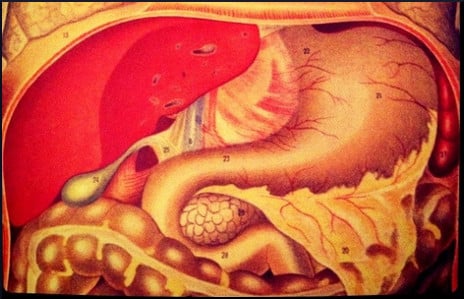 “The Gut Microbiome and Childhood Obesity: Connecting the Dots” was published in the June 2015 issue of the journal Childhood Obesity. This interview with Noel Theodore Mueller, who is a Postdoctoral Research Fellow at Columbia University Medical Center, strongly incriminates gut bacteria as a cause of childhood obesity.
“The Gut Microbiome and Childhood Obesity: Connecting the Dots” was published in the June 2015 issue of the journal Childhood Obesity. This interview with Noel Theodore Mueller, who is a Postdoctoral Research Fellow at Columbia University Medical Center, strongly incriminates gut bacteria as a cause of childhood obesity.
The first thing to know is that a human intestinal system typically plays host to “tens of trillions” of creatures, mostly bacteria. The great majority of them are commensal, meaning we don’t bother them and they don’t bother us. In fact, they provide us with services. But a gutful of imbalanced microbiota can throw a monkey wrench into the works. That condition of imbalance is known as dysbiosis.
Many scientists are quite satisfied with the evidence that the microbiome, the world of organisms that live inside us, has a very great influence on autoimmune conditions, as well as infectious diseases and metabolic disorders. Mueller goes so far as to say:
In fact, it is within the realm of possibility that microbiota play a role in most human pathologies. The upside for those interested in improving public health is that, unlike our genetic code, the human microbiome can be modified and cultivated by lifestyle and environmental factors.
Based on various studies, he leans toward the opinion that if intervention is to be carried out to influence the gut microbiota, the best time is during the first three years of life. It seems that then the door begins to close—but it never closes all the way, and researchers in this field find that augmentation of the intestinal fauna can be therapeutically effective later in life. The best-case scenario will be to discover how to fix the problem in newborn babies, or possibly even when they are still in their gestational stage.
Mystery still surrounds the exact process through which a baby acquires its first colonies of bacteria, although obviously the mother has a lot to do with it. But like the proverbial onion, this topic has many layers. Dr. Mueller says:
These earliest exposures to the microbial world are also paramount for educating the newborn immune system, developing their organs, and also potentially programming their metabolic function.
Metabolic function seems to have a lot to do with obesity, and if the gut microbiota strongly influence the metabolic function, the connection can’t be ignored. The strongest evidence comes from Washington University:
Seminal research from Jeff Gordon’s lab out of Washington University in St. Louis has demonstrated that transplanting obese fecal microbiota into germ-free mice causes these mice to become obese compared to germ-free mice inoculated with fecal microbiota from normal weight individuals. Importantly this translational research showed that the observational association between gut microbiota and obesity might indeed be causal.
In some quarters this is regarded as quite an astonishing claim, and our following post will take a closer look at that study.
Your responses and feedback are welcome!
Source: “The Gut Microbiome and Childhood Obesity: Connecting the Dots,” Liebertpub.com, June 2015
Image by Memi Beltrame

 FAQs and Media Requests:
FAQs and Media Requests: 











